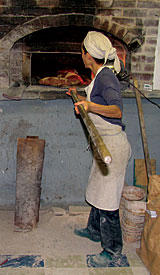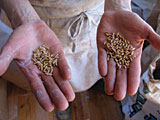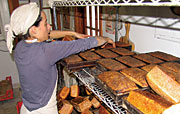 |
Jennifer Lapidus has been up for seven hours, since 4 a.m., worrying about, fussing with and handling bread — a fact which might dim a lesser business owner’s enthusiasm for her product.
But instead of sinking into a bleary silence, Lapidus, owner of Natural Bridge Bakery, is up and baking. One after another, she pulls risen loaves, soft and pliant, off a “couche” of heavy canvas, sets them on a long-handled metal paddle called a peel, slashes their tops with a razor once, twice, three times, and slides them deep inside the oven. A friend of hers calls her pace “frenetic,” and her actions in the bakery do little to challenge this characterization.
“I’m sorry I talk so fast,” Lapidus says, wheeling her peel around and narrowly missing my head with the butt end of it. “I’m a slow-food person. But I’m definitely not a slow person.”
Lapidus, whose business is tucked alongside a secondary road in the rural community of Walnut, near Marshall in Madison County, is one of a number of bakers serving the greater Asheville area who are reclaiming the art of baking, creating products that are as much an expression of themselves, their varied passions, as they are a source of nutrition.
The night before was unexpectedly cold, and, living things that they are, Lapidus’ loaves are a little less than willing this morning. Instead of commercial yeast, with its predictable behavior, Lapidus leavens her bread by means of a Flemish method called desem, using the micro-organisms that occur naturally on the grain she bakes with.
“Baking is a dance between time and temperature,” she says. “It’s always a dance.”
The desem starters Lapidus keeps in a refrigerator in her milling room: one made of cracked rye that smells as inviting as a freshly served ale, and a whole-wheat starter that crackles with tartness. Her slow-rising process, Lapidus insists, yields breads that are as digestible as they are nutritious. The starters are slow-cultured over a period of days from a lump of original cultures called “mothers,” which bide their time in plastic tubs at the back of the fridge.
“Don’t [mess] with my mothers,” Lapidus says.
I assure her that I won’t.

Grain on a higher plane: Kamut, left, is rich both in protein and in history. (Spelt, another storied grain, is shown at right.) Photo by Ken Priestly
|
Lapidus uses only organic grains, which she mills freshly for each bake. Recently she has become enamored of Kamut, a proprietary relative of durum wheat that boasts a massive grain. Purported to have been lifted from an Egyptian tomb by a U.S. Airman during World War II, Kamut is grown today exclusively on the high plains of Montana and Canada’s Saskatchewan Province.
Whatever its murky past, Kamut yields bread with a golden color, a touch of sweetness, and a higher amount of protein than whole-wheat.
“To me, it’s about making good food,” says Lapidus, explaining her desire to always refine her art, to employ new ingredients and techniques. “And part of good food is the question: Is this feeding us? Taste, satisfaction and pleasure are all a part of that.”
Rising to the occasion
Lapidus’ Natural Bridge Bakery will be one of more than 15 mostly local bakeries showcasing at the 2nd annual Asheville Artisan Bread Bakers Festival this Saturday, April 1. Last year’s festival was held solely at Greenlife Grocery on Merrimon Avenue; this year the festival will divide its time between Greenlife and the A-B Tech campus.

“Don’t [mess] with my mothers,” says protective baker Jennifer Lapidus, referring to the starter cultures (not shown) that spawn her bread.
|
The event, says organizer Steve Bardwell — who, with Gail Lunsford, owns Wake Robin Farm Breads in Marshall — is the only one of its kind in the Southeast.
“Last year we were just overwhelmed with the response,” Bardwell says. “There were 600 or 700 people crowded into Greenlife. It was a madhouse.”
This year the festival is bigger, he says, with “more time, more workshops, and more bakeries on the list.”
Asheville’s bakers are a diverse lot. They finish their loaves in brick ovens that, overlooking a few modern accoutrements, would look right at home in medieval Europe. They bake in commercial ovens polished to a high sheen. They bake a handful of loaves per day. They bake hundreds of them.
Peter Reinhart, author of the baking classic Brother Juniper’s Bread Book, and, more recently, The Bread Baker’s Apprentice and American Pie: My Search for the Perfect Pizza, will be a featured speaker at Saturday’s event.
Reinhart says that “Asheville and its surrounding area, with a very small population, supports more artisan bakeries than most states. There are many cities much bigger — Charlotte, where I live, for instance — that don’t have a single artisan bakery. What that reflects is Asheville’s choice to support its local artisans, and baking truly is one of the culinary arts.”
Reviving an art
What is it about bread baking that inspires such devotion? Bardwell thinks he knows.
“It’s the challenge of it,” he says.
At its most basic, bread is the humble trio water, flour and salt (yeast, as the ancients learned not long after they had domesticated wild grasses into the ancestors of the grains we eat today, is borne on every breath of air). But the transformation that comes with the baker’s touch is so profound it borders on alchemical.
Says Bardwell, “As a baker, you’re in touch with something really simple, and yet you can take it and make it as complex and interesting and sublime as you can imagine. That’s the amazing thing about bread making.”
Outside of major cities, the U.S. has never had a baking tradition as developed as the old world’s, and what had arisen here was mostly swept away on the tide of 20th-century convenience. Who, of a certain age, doesn’t remember schoolmates rolling sooty, soft balls from the white slices that enclosed their bologna or peanut butter and jelly?
In most communities, bakeries, if they survived at all, did so as places where dowdy seniors shopped for tea cookies and the occasional birthday cake.
The first weak bubblings of an artisan-bread revival came in this country during the 1960s and 1970s, especially among the more health-conscious, who were eager to return a shred of dignity and substance to this most prosaic of foods. Their emphasis on whole grains, though, often yielded loaves more suitable for use as doorstops than as table fare.
In the intervening years, American bakers have refined their techniques and simultaneously borrowed many of the most successful European methods. Recently the country appears to some degree to have shaken off the tyranny of the soft sandwich loaf. Bread labeled “European” or “Artisan” has carved out a substantial niche in supermarket bakery sections. And, while it lacks the “local” cachet, Bardwell says its appearance at all is sign that more enlightened consumers are afoot.


Before you comment
The comments section is here to provide a platform for civil dialogue on the issues we face together as a local community. Xpress is committed to offering this platform for all voices, but when the tone of the discussion gets nasty or strays off topic, we believe many people choose not to participate. Xpress editors are determined to moderate comments to ensure a constructive interchange is maintained. All comments judged not to be in keeping with the spirit of civil discourse will be removed and repeat violators will be banned. See here for our terms of service. Thank you for being part of this effort to promote respectful discussion.